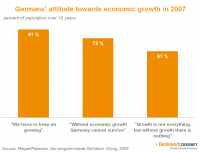Risks of decreasing material wealth
In view of current attitudes and behaviour, stagnation or even a drop in material wealth contains great risks for social peace and the stability of social order. Western populations are strongly formed by the pursuit of property, consumer mentality and material wealth.
First and foremost they have made the functionality of their societies dependent on permanent economic growth. "Without growth no investments, without growth no employment, without growth no funds for education, without growth no help for the poor. And vice versa: With growth investments, employment, resources for education, help for the poor and - which is most important - trust by the people"1, as the German Chancellor, Angela Merkel, said in her government policy statement on November 10th 2009. The other political parties, trade unions, employers' associations and not least the population hold exactly the same view. On no other question do they agree more closely. Everyone wants to do everything to bring about more growth.
If growth fails to materialize, then even the existence of free democratic systems will be jeopardized. As early as 1978, the heads of state and government of the so-called G-7 countries stated that without lasting economic growth their countries would not be governable.2 Nothing has changed in that regard since then. In a study from 2008, the Friedrich-Ebert-Stiftung (a foundation of the German Social Democrats) ascertained that the "acceptance of the democratic system is linked to a guarantee of material wealth by many people". "The feeling that one's own prosperity is endangered often ends in a climate of discontent with democracy [...]. This means that the acceptance of a democratic constitution stands or falls with material wealth."3




